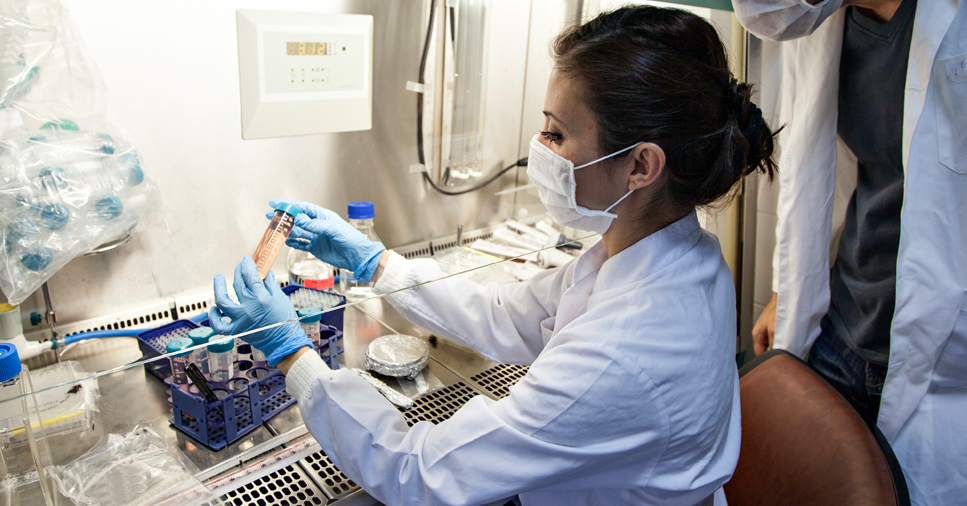Dr. Amelia Wiggins, orthopedic specialist with Mercy Health, discusses biologic regenerative medicine with radio personality Mike McConnell on 700WLW’s Mercy Health Medical Minute podcast.
Mike McConnell: We’re here to talk about biologics, which as you just explained to me is the use of stem cells to help heal and regenerate.
Dr. Wiggins: Exactly, biologics are just internal growth factors that you naturally have in your body. But, when used appropriately, they can help decrease inflammation and speed up the healing process.
Mike McConnell: So, under what circumstances does someone come to you when something hurts?
Dr. Wiggins: So, usually people come with a chronic knee or shoulder pain, tendinitis, and sometimes tennis elbow. Chronic injuries that have a hard time healing are good opportunities for PRP or stems cells to help.
Mike McConnell: So, would someone come to you and say they were interested in biologics as opposed to surgery? Or would their doctor have made that determination?
Dr. Wiggins: When you come and talk to your orthopedic physician, we tailor the treatment to you. You are an individual and your injury is unique to you. So, your treatment plan will be unique to you. This isn’t really something a family doctor would refer you to. It’s more of a conversation I have with my patents about their injury, their goals and how we can get them better. This is just one more tool in our tool box we can use to help.
Mike McConnell: How do you get my stem cell from me and where do you get them?
Dr. Wiggins: That depends on what we’re doing most of the time we take them from the hip or your iliac crest.
Mike McConnell: What if I had tennis elbow?
Dr. Wiggins: Tennis elbow would actually be a great indication for PRP. So, not necessarily stem cells, but instead platelet rich plasma. So, we do a blood draw in the office. We spin down your blood and get it concentrated with a high number of platelets. That’s important because those platelets have growth factors in them. Those growth factors when injected into the site of injury help boost a healthy immune response to heal that area. What happens with a lot of these chronic tendon injuries is that the body quits sending the healthy cells to heal them. So, by us giving the PRP injection in that area we’re sending five to ten times concentrated healthy healing cells to that area.
Mike McConnell: Is this something that typically works every time, or something that you might try and then surgery is the next step?
Dr. Wiggins: It doesn’t work 100 percent of the time, but for tendinitis it has a very high success rate and we can often avoid surgery.
Mike McConnell: So, is it an office procedure or a hospital procedure?
Dr. Wiggins: The PRP injections are an office procedure. You would come in and we would take your blood that day, spin it down and do the injection. Usually we do this under ultrasound so we know exactly where we’re injecting. Then over the next few days to a week you might notice some soreness at the area or inflammation. That’s good, because this is your body’s way of healing that area. You’ll notice improvement moving forward and sometimes we’ll have to do two or three injections. Now, the procedure for stem cells is different. It’s done in a hospital. It is a surgical procedure where we are harvesting stem cells from you, and then injecting them into another area.
Mike McConnell: What is the thumbnail sketch as to how that works? Under what circumstances would you use stem cells?
Dr. Wiggins: One of our doctors is using them to help with back pain and I am using them to help with arthritis in the knee. So, I might put stem cells into a knee after surgery to help regenerate the cells.
Mike McConnell: Do stem cells regenerate in my body no matter where you took them from?
Dr. Wiggins: Yes, stem cells are just immature cells. They have the greatest potential to promote healing. So, when they are brought to a site of injury they become whatever the injury needs.
Mike McConnell: So, how does it fit into Mercy Health’s continuum of care with orthopedics?
Dr. Wiggins: Well, like I said this is just one of the many tools we have. So, first you need to make an appointment with us. Once you come see us, we’ll ask what the problem is and how long it has been going on and what you’re hoping to get back to. You may be an appropriate candidate for this but sometimes physical therapy or surgery is the better option.
Tune into Mercy Health Medical Minute on 700WLW AM at 7:45 a.m. Monday-Friday. Each week, Mercy Health experts share their medical interest and insights.






